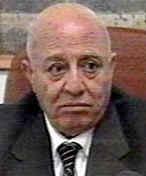Fatah Elects Abu Ala, Is Fractured by Deadly Abbas-Arafat Feud
In the space of a few hours, Yasser Arafat had his chosen candidate for next prime minister, Ahmed Qurai (Abu Ala), approved by ruling Fatah and PLO institutions Sunday night, September 7, and is expected to gain endorsement at the same high speed from the Palestinian legislature. He wanted Mahmoud Abbas, who resigned the post Saturday, September 6, amid a bitter power struggle, replaced fast before the scale of the earthquake entailed in the changeover was fully appreciated in Washington, Jerusalem and Cairo.
The first official response from Washington to Abbas’s resignation – amid accusations that Arafat of had sabotaged his premiership – was remarkably mild. Arafat was given to understand that the Bush administration would accept any prime minister undertaking to carry out Abu Mazen’s obligations to break up terrorist organizations. The message came from the State Department which appears to be in charge of the issue. It indicated how easy Washington was finding it to write-off of the Palestinian protege, who played a starring role as recently as June 6 at the Aqaba summit with the US president and the Israeli prime minister.
According to debkafile‘s intelligence sources, Arafat had implicitly threatened his rival with strong-arm action by his own presidential Force 17 guards. He had moreover sent these heavies at week’s end to raid the offices of finance minister Salim Fayyad’s in Ramallah, making off with files and leaving havoc. Clearly, Arafat was encouraged by gaining the upper hand against the Bush-endorsed Palestinian prime minister to flex his muscles against the finance minister who was appointed more than year ago at US insistence to bring order and transparency to Palestinian Authority finances,
Yet the signals coming from Washington Sunday could easily have been interpreted as indicating that all was forgiven.
Arafat’s rush to fill Abu Mazen’s shoes also covers up the fact that the two men remain locked in a life-and-death struggle that has seriously fractured the Fatah movement of which they are the only surviving founders.
The fat was in the fire when Abbas’s advisers identified the masked men who led the rowdy mob surrounding him last week outside the Palestinian Legislative Council chamber as members of Arafat’s presidential “Force 17” guard. That was when Abu Mazen, fearing for his life, resolived finally to quit, according to debkafile‘s Palestinian sources, and stay out of office as long as Arafat was alive. He recalled to his close circle the murder of Hisham Makki, the Palestinian TV director, who was shot down in January 2001 as he left the Gaza City studios by Force 17 gunmen posing as Jordanian agents. Makki’s financial misdeeds were becoming too brazen and too close to incriminating Arafat’s office for comfort.
If Abu Mazen goes in fear of his life, so too does Arafat who believes the former prime minister or his supporters are out to get him.
Arafat calls Abbas “Karzai”. He is quoted by our Palestinian sources as saying: “Karzai is capable of anything. After all he is the lackey of American masters in Washington and the Jews in Tel Aviv.”
The strain of their quarrel is dividing the Fatah into four rival factions:
— The Arafat camp;
— The camp led by Abbas and his former interior security minister Mohamed Dahlan;
— The West Bank Fatah, once the backbone of Abbas’s support as prime minister, which ditched him for Arafat when he made the epic mistake of not handing out jobs to any West Bankers.
— The Veteran Leadership of the Fatah Central Committee. While lacking mass popularity on the Palestinian street, these old warhorses enjoy much respect and their support is invaluable for any premiership candidate.
Arafat’s preferred candidate is the colorless chairman of the Palestinian Legislative Council and member of negotiating team at the 1993 Oslo Accords, Ahmed Qurai, aged 66. While protesting his health would not stand up to the arduous and demanding job of prime minister, Abu Ala busily rallied the Oslo Faction of the Palestinian leadership to support his claim.
A banker by profession, he has never had much of a power base in the PLO or the Palestinian street. His greatest asset appears to be his unquestioning loyalty to Arafat.
If Qurai fails to get in after all – Arafat is notoriously unpredictable – other potential candidates have lined up:
Muneib al Masri, 70, a Nablus-based American-Palestinian multimillionaire who used to pay for Arafat’s overseas trips and hotels and still covers the costs of Palestinian delegations visiting Washington. His only diplomatic experience comes from the occasional errands he carries out for Arafat. His US passport would enable Arafat to defend himself against accusations of acting against American interests.
Jibril Rajoub.Since his appointment as Arafat’s national security adviser, Rajoub is flying high. He enjoys the support of a substantial faction in the legislative council and is lobbying hard for support in the Egyptian president’s office headed by Osama al Baz and intelligence chief Omar Suleiman and the royal bureau of Jordan’s king Abdullah – so far without much success.
Hanni al-Hassan. Close Arafat confidant, whom he preferred as internal security minister to Abbas’ choice of Mohamed Dahlan. Al-Hassan bears a grudge against them both. His main contacts are to be found in the courts of the Persian Gulf Emirs of Qatar, Oman and Abu Dhabi, which enables him to raise cash when needed quickly to meet Palestinian Authority financial crises.
Nabil Shaath. Palestinian foreign minister, Arafat loyalist with the gift of adaptability to political reality. With little chance of getting the post, his usefulness lies in his talent for talking fast out of two sides of his mouth, saying at the same time what both Arafat and Washington will want to hear.


